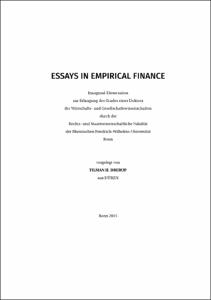Essays in Empirical Finance

Essays in Empirical Finance

| dc.contributor.advisor | Theissen, Erik | |
| dc.contributor.author | Drerup, Tilman H. | |
| dc.date.accessioned | 2020-04-20T14:17:36Z | |
| dc.date.available | 2020-04-20T14:17:36Z | |
| dc.date.issued | 08.01.2015 | |
| dc.identifier.uri | https://hdl.handle.net/20.500.11811/6369 | |
| dc.description.abstract | The three chapters of this thesis contain contributions to distinct branches of the finance literature---corporate finance, accounting, and household finance. Although the chapters address questions with little overlap, they share one common element. All chapters emphasise the paramount role of expectations in financial markets. Theoretical arguments, both rational and irrational (e.g., Fama (1970), Shiller (1981)), suggest that investors' expectations are central to the formation of stock prices. Because expectations themselves are rarely directly observable, much research in empirical finance uses changes in stock prices to infer changes in expectations. The first two chapters of this thesis build on the appealing intuition of this approach. In both chapters, I inspect the behaviour of stock prices around events that prior literature considers value-relevant. In neither chapter, however, I treat changes in prices as ends in themselves. Rather, to understand why investors changed their expectations of firm value, both chapters attempt to simultaneously identify changes in fundamentally relevant information. The first chapter takes a purely empirical, exploratory approach to this issue by looking at the long-term consequences of hedge-fund activism in German firms. The second chapter embeds the same rationale in a stylised theoretical model that allows me to empirically analyse the value of sell-side analysts' recommendation revisions in a more structured way. The third chapter of this thesis analyses the role of expectations in investors' decisions to invest in the stock market. Expectations, in particular those about risk and return, are assigned a major part in models of stock market participation. Patterns in empirically elicited expectations, however, suggest that the latter are measured with error (e.g., Manski (2004), Hurd (2009)). In the paper that underlies this chapter, Benjamin Enke, Hans-Martin von Gaudecker, and I argue that the magnitude of this measurement error can be used to uncover heterogeneity in households' choice behaviour. We empirically assess this hypothesis using data on expectations and stock market participation specifically collected for this purpose as part of a representative survey. | en |
| dc.language.iso | eng | |
| dc.rights | In Copyright | |
| dc.rights.uri | http://rightsstatements.org/vocab/InC/1.0/ | |
| dc.subject.ddc | 330 Wirtschaft | |
| dc.title | Essays in Empirical Finance | |
| dc.type | Dissertation oder Habilitation | |
| dc.publisher.name | Universitäts- und Landesbibliothek Bonn | |
| dc.publisher.location | Bonn | |
| dc.rights.accessRights | openAccess | |
| dc.identifier.urn | https://nbn-resolving.org/urn:nbn:de:hbz:5-38690 | |
| ulbbn.pubtype | Erstveröffentlichung | |
| ulbbnediss.affiliation.name | Rheinische Friedrich-Wilhelms-Universität Bonn | |
| ulbbnediss.affiliation.location | Bonn | |
| ulbbnediss.thesis.level | Dissertation | |
| ulbbnediss.dissID | 3869 | |
| ulbbnediss.date.accepted | 11.12.2014 | |
| ulbbnediss.institute | Rechts- und Staatswissenschaftliche Fakultät / Fachbereich Wirtschaftswissenschaften : Institut für angewandte Mikroökonomik | |
| ulbbnediss.fakultaet | Rechts- und Staatswissenschaftliche Fakultät | |
| dc.contributor.coReferee | von Gaudecker, Hans-Martin |
Dateien zu dieser Ressource
Das Dokument erscheint in:
-
E-Dissertationen (288)




